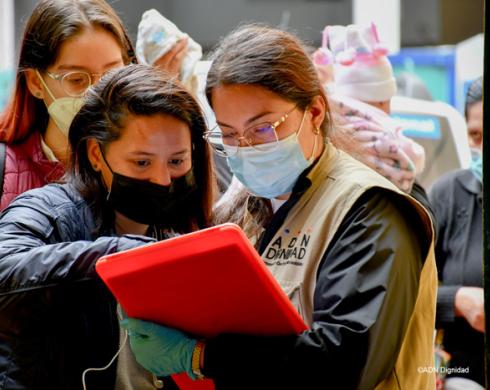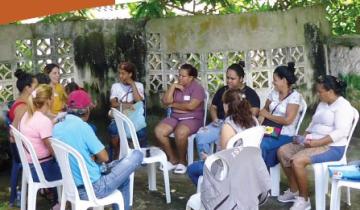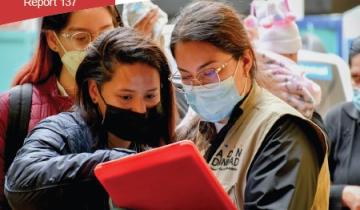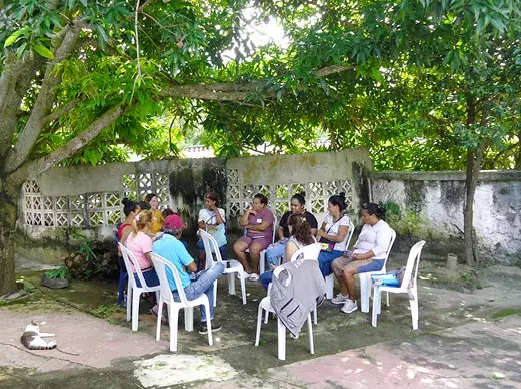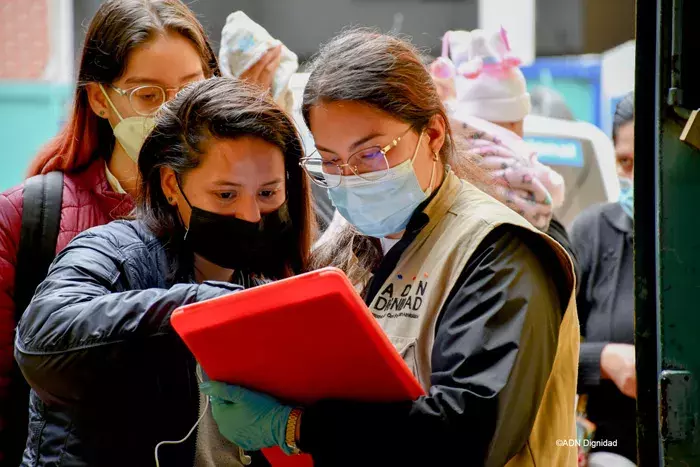Studying Impacts of a Humanitarian Cash Transfer Program in Colombia
People displaced because of humanitarian crises around the world face immense challenges meeting basic needs, accessing public services and livelihood support. In Colombia, the ADN Dignidad program provides unconditional cash transfers to Venezuelan migrants, Colombian returnees and host communities to help recipients access basic food, non-food items, and shelter. To study its long-term effectiveness in aiding the displaced individuals, 3ie recently completed a second impact evaluation of the program implemented by Action Against Hunger, Danish Refugee Council (DRC), and Norwegian Refugee Council (NRC) and funded by USAID’s Bureau for Humanitarian Assistance (BHA).

Background
Colombia is home to more than 2.9 million Venezuelan migrants, making it one of the largest displacement movements in the world. Sixty percent of them have irregular access to public services and very few coping strategies to support their integration. Understanding how to support these displaced populations is imperative. Despite cash transfers being well-established as an effective development tool, little is known about their effectiveness in aiding displaced populations in the Latin America context. 3ie’s impact evaluation contributes to filling this gap by answering critical questions about the effectiveness of unconditional cash transfers for improving the lives of displaced individuals (both displaced Venezuelans and Colombian returnees) and their household conditions.
The ADN Dignidad program aims to improve access to basic food and non-food items, and shelter through the provision of up to six months of unconditional multipurpose cash assistance (MPCA) transfers of approximately $ 77 USD per recipient household and reaches close to 356,000 migration situation-affected individuals. To leverage the impact of the MPCA, the project provided nutritional messaging aimed at maximizing the nutritional impact of the MPCA transfers. The program also focuses on how to improve the overall protective environment for target groups by increasing their awareness of locally available and legally accessible social protection (education and health) and legal services.
Evaluation approach
To assess this program, the 3ie and the ADN Dignidad teams used a Regression Discontinuity Design (RDD) that leveraged the program’s clearly established and well-implemented rules of operation.
We conducted a long-term impact study to complement the results of a previous short-term impact evaluation, which measured impacts one to three months after the program’s completion. This time, we surveyed 2163 households from the same sample approximately 18 months after the beneficiaries stopped receiving aid. The extended timeframe allows for a comprehensive analysis of the program's long-term impacts on the well-being of displaced individuals and their ability to meet basic needs and access essential services.
Findings
The study shows the program’s positive impact on food security persists for over a year after its completion. The program’s beneficiaries show a significant—16 percent—drop in their dependence on reduced meal sizes and fewer meals per day in the household. The effect on the Venezuelan population is higher than on other groups, including Colombian returnees, the host population, pendular migrants, and those with dual nationality, with a 22 percent reduction in the use of reduced meal sizes. Additionally, this population’s dependence on cheaper meals is 11 percent lower.
Liberando el impacto de ADN Dignidad: ¡Vea cómo los beneficiarios marcaron la diferencia!
Descubra cómo el programa de transferencias monetarias multipropósito generó cambios positivos. En promedio, los participantes experimentaron mayores ingresos, menor inseguridad alimentaria, mayor bienestar y más. Su experiencia informa mejores intervenciones de ayuda y oportunidades para todos.
To share study findings with participants, we summarised the results and impact. This content is currently available in Spanish only.
Presentation of the evaluation results
Action Against Hunger organized a discussion on the second phase findings in Bogota, Colombia, on 27 September 2024. 3ie senior research fellow Pablo Celhay presented the findings as part of a panel comprising Mireia Villar Forner, Resident Coordinator for Colombia and Humanitarian Coordinator of United Nations Jhon Orlando, Country Director of Action Against Hunger and Eric Besse, Chief of Party of Cash for Urban Assistance Consortium.
This note examines how the ADN Dignidad cash transfer program affected migration patterns among Venezuelan and Colombian-returnee households in Colombia. Read the findings here.
